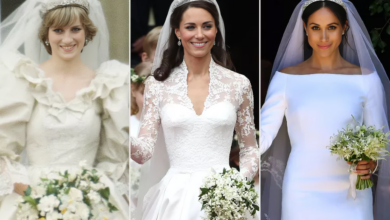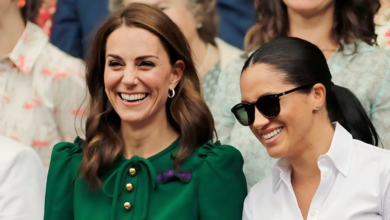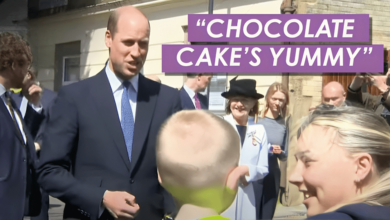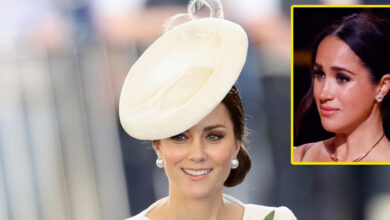Prince William Says He and Kate Are ‘Extremely Concerned’ About Antisemitism Rise During Synagogue Visit

Prince William is stepping out and stepping up his efforts to help communities heal.
The Prince of Wales, 41, visited a synagogue on Thursday in the second of two outings to recognize both the rise in antisemitism and the human suffering in the Middle East.
The royal appeared at the Western Marble Arch Synagogue in London, where he joined a conversation with young ambassadors of the Holocaust Educational Trust who work in the community as advocates against hatred and antisemitism.
“Antisemitism has no place in our society…Both Catherine and I are extremely concerned about the rise of antisemitism,” Prince William said during the visit, which was originally planned to coincide with Holocaust Memorial Day but postponed due to Kate Middleton’s abdominal surgery. It was reinstated as soon as was practicable, according to palace aides.
:max_bytes(150000):strip_icc():focal(701x257:703x259):format(webp)/prince-william-prince-of-wales-western-marble-arch-synagogue-022924-1-30f4eda8b4584363be5bda0cd80bffbb.jpg)
It was also the first public appearance for Prince William since he abruptly pulled out of a memorial service for his late godfather King Constantine of Greece on Tuesday due to an unspecified personal matter, a palace source said at the time. Amid the last-minute change of plans, which was set to see Prince William do a reading at the service, the palace noted that the Princess of Wales, 42, is “doing well” amid her recovery from her surgery last month. During the outing, William received a bouquet of flowers for his wife.
:max_bytes(150000):strip_icc():focal(749x0:751x2):format(webp)/prince-william-prince-of-wales-western-marble-arch-synagogue-022924-10-259e885e9869492bbdeed02365f22b47.jpg)
The service was also on the same day that the royal family revealed the “shock” death of Lady Gabriella’s husband, Thomas Kingston, at just 45.
:max_bytes(150000):strip_icc():focal(749x0:751x2):format(webp)/prince-william-prince-of-wales-western-marble-arch-synagogue-022924-5-c9d244e86fd746398b862c3991841d6c.jpg)
Prince William’s engagement at the synagogue came a week after he visited the British Red Cross headquarters in London to see and hear about some of the relief efforts taking place on the ground in Gaza.
He is also scheduled to take part in further outings this week and is expected to be in Wales for St David’s Day on Friday.
:max_bytes(150000):strip_icc():focal(749x0:751x2):format(webp)/prince-william-prince-of-wales-western-marble-arch-synagogue-022924-3-0f38fb670a374b369939876363f82e2f.jpg)
Shortly after arriving at the synagogue on Thursday morning, the prince was shown around and told about the Jewish community it supports.
Karen Pollock, CEO of the Holocaust Educational Trust, tells PEOPLE, “It was a really special engagement. Having His Royal Highness visit the synagogue and learn a bit about the community and looking at the history of the synagogue was lovely. But what was fantastic was how obvious he really wanted to understand about how the community feels about antisemitism today.”
He heard about how the Holocaust Educational Trust is delivering programs to combat hatred and encourage cross-community cohesion.
Key to the work of the Holocaust Educational Trust is the outreach by young ambassadors from all backgrounds, who are part of the H.E.T.’s flagship “Lessons from Auschwitz” project. They learn the history of the Holocaust and visit the site of the former Nazi concentration and death camp Auschwitz-Birkenau. It aims to help them with the tools to call out antisemitism and hatred wherever they are found, and they are committed to sharing what they’ve learned with their communities across the U.K.
:max_bytes(150000):strip_icc():focal(749x0:751x2):format(webp)/prince-william-prince-of-wales-western-marble-arch-synagogue-022924-12-25db5c7faa8a4b7da932dfc7e91eaa1c.jpg)
Prince William met with students, including a pupil at Leeds University, one from Edinburgh University and a leader of the Union of Jewish Students.
“He met some Jewish students, who spoke eloquently about some of the incidents they have experienced or the fears and anxieties of their peers. He was really empathetic,” Pollock says.
“He also heard from some of our Holocaust Educational Trust ambassadors, some of whom are not Jewish,” she adds. “They were talking about the importance of education and how important in terms of fighting antisemitism and fighting hate. Having the information means you can call out those who might be antisemitism with intent or saying things they should know better.”
“He gave them a lot of encouragement in terms of telling them to keep on fighting the fight,” Pollack continues. “I think he was pretty clear to the group that we shouldn’t tolerate antisemitism. He said that on behalf of himself and Her Royal Highness. They are concerned about this.”
:max_bytes(150000):strip_icc():focal(749x0:751x2):format(webp)/prince-william-prince-of-wales-western-marble-arch-synagogue-022924-2-2a70c283c5ef4e70b054fe984aaafcd1.jpg)
Prince William met 94-year-old Holocaust survivor Renee Salt who told him about her experiences.
She was “quite nervous, and he sat down and took her hands. Her heard her whole story,” says Pollock. She survived Bergen Belsen and Auschwitz. It is very hard to listen to. She told him of her husband who was a liberator of the camps. He was listening and he asked her about antisemitism today, and she said she is very worried about it and she told him about her grandson who she worries about.”
Pollock continues, “She has a book coming out next year, and he said he’d read it. It was a very intimate conversation between the two of them. She said at the end, ‘I’ll never forget this.’ It meant so much to her that he spent the time.”
Prince William and Princess Kate have both been “profoundly concerned by events that unfolded in late 2023 and continue to hold all the victims, their family and friends in their hearts and minds,” the palace said last week.
Just before visiting the British Red Cross headquarters on Feb. 20, William issued a strongly-worded statement saying, “I remain deeply concerned about the terrible human cost of the conflict in the Middle East since the Hamas terrorist attack on 7 October. Too many have been killed.”
:max_bytes(150000):strip_icc():focal(749x0:751x2):format(webp)/prince-william-prince-of-wales-western-marble-arch-synagogue-022924-6-a6c54f8efb8748c8ac038b74386118dd.jpg)
“I, like so many others, want to see an end to the fighting as soon as possible. There is a desperate need for increased humanitarian support to Gaza. It’s critical that aid gets in and the hostages are released,” he added. “Sometimes it is only when faced with the sheer scale of human suffering that the importance of permanent peace is brought home.”
Prince William concluded, “Even in the darkest hour, we must not succumb to the counsel of despair. I continue to cling to the hope that a brighter future can be found and I refuse to give up on that.”
:max_bytes(150000):strip_icc():focal(749x0:751x2):format(webp)/prince-william-prince-of-wales-western-marble-arch-synagogue-022924-11-0b6f6b18085f4fdea1b37b854288fda6.jpg)





